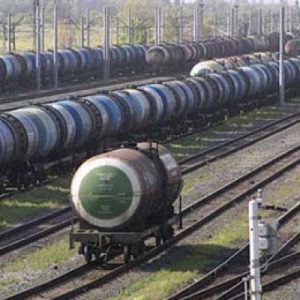Belarusian Solvents: A Tricky Path to Economic Growth

Despite the proclaimed common Russia-Belarus way to prosperity within the Customs Union, neither country is ready to sacrifice individual economic interests for this cooperation. On 24 July Russia stopped railway deliveries of straight-run gasoline – the main raw material used in solvents’ production – to Belarus. This was the culmination of this summer’s solvents conflict. The measure is timely, but is likely to result in considerable deterioration of Belarus' economy’s performance.
During the first five months of 2012 Belarusian trade and services surplus amounted to $3bn, compared to the yearly forecast of $1-1.5bn. For Belarus, which suffered greatly from insufficiency of foreign trade last year, these results were a real success. The joy has, however, faded away due to quite unexpected revelations.
The pleasant figures resulted from Belarus' evasion of its obligations under the terms of the Russia-Belarus oil agreements. Belarus started to export oil products under the label of solvents ‒ liquids used for dissolving other substances, manufactured with use of straight-run gasoline, but not classified as oil products. That meant Belarus’ economic growth is achieved at Russia’s expense.
Solvents were among most widely exported Belarusian products for a long time, but this year the growth rate of their export became almost unbelievable. The increase in export of solvents during January – April 2012 compared to January – April of last year made Belarus $1.472m. The cost of their export to countries outside the Customs Union during January – May 2012 amounted to $2.180m. In the Belarusian export structure their export’s share amounted up to 10.4%.
Rise of the Conflict
The rise of solvents’ exports attracted the attention of Russian authorities already in the spring of 2012, and the suspicions that Belarus' exported oil products under the solvents’ label started to grow. On the official level there was no place for such concerns until June 6, when Russia’s ambassador to Belarus Aleksandr Surikov noted that “Belarusian import of Russian oil products increased several times, including four times during 2012”. He also added that “Belarus imports more than it needs for internal consumption” and that “in the Customs Union some reports of solvents and thinners, not being subject to duties, have appeared”.
The Head of the State Customs Committee of Belarus quickly assured authorities that all oil products’ deliveries were legal, but this did not satisfy Russia. On 15 June, Dmitry Medvedev instructed the authorised Russian state bodies to analyse the situation with the solvents. The investigation resulted in a declaration by the Russian Deputy Minister of Finance that Belarusian solvents may serve as “a cloak for the export of oil products”.
However, there has been no single direct evidence of such violations yet.
Oil Agreements
During the period of the Customs Union’s creation, the two countries agreed that Belarus would be entitled to import Russian oil on a duty-free basis, but also undertook to transfer to the Russian budget the whole amount of export duties on “crude oil and certain categories of products produced from oil (“oil products”)” exported from its territory to third-party countries. Export duties from the extraction of its own oil (estimated 1.7m tonnes a year) go to the Belarusian budget.
The agreement aimed at settling the long-lasting oil wars of 2010 between the two countries. And until now it coped with this role. Russia delivered oil to Belarus without any duties’ requirement. Belarus, in compliance with its international obligations, transferred to the Russian budget $3.07bn of export duties on oil products exported to third-party countries in 2011. In January-April 2012 the amount was $1,472.6m. The business seemed to be mutually beneficial.
The solvents never were within the scope of the agreement before, since they are not classified as oil products. Accordingly, Belarus has not transferred to Russia export duties on solvents. At the same time, if Belarus actually exports oil products under the solvents’ label, it turns out to be guilty of evading its obligation to pay the export duty on them to Russia and threatening the fragile oil truce.
Economic and Political Interests
GDP growth of Belarus may decrease by 50% Read more
The amount of money at stake aggravates the situation. The alleged losses to the Russian budget from the illegal export of solvents amounted up to $1bn. According to Belarusian economic analyst Yaraslau Ramanchuk, if the same rules as those established for oil products apply to export of solvents, GDP growth of Belarus may decrease by 50%. But for these figures, the countries would probably avoid a revelation of these types of troubles to preserve the image of successful Belarus-Russia cooperation.
The political factors, however, can also play a negative role: the truth about this whole situation may never come to the surface. However widely announced the discussions of the solvents’ problem were by the prime ministers of the two countries, all we know is that the two states agreed to examine the case and to right a wrong. Though the top-level meetings took place more than two weeks ago, their findings have not been published.
There, of course, may be one more reason for this silence. If Russia’s allegations are justified, the question of who is guilty is going to arise. And the answers may be unpleasant. Belarus has two major solvents’ exporters, one of which is Triple, famous for its owner's very close relations with Alexander Lukashenka.
Could the solvents be illegally exported in such great amounts without participation of Triple and could the head of Triple act without authorization from higher-ups? Belarus analysts also claim it is a rhetorical question whether Belarus could implement the alleged scheme without Russian oil oligarchs’ participation.





